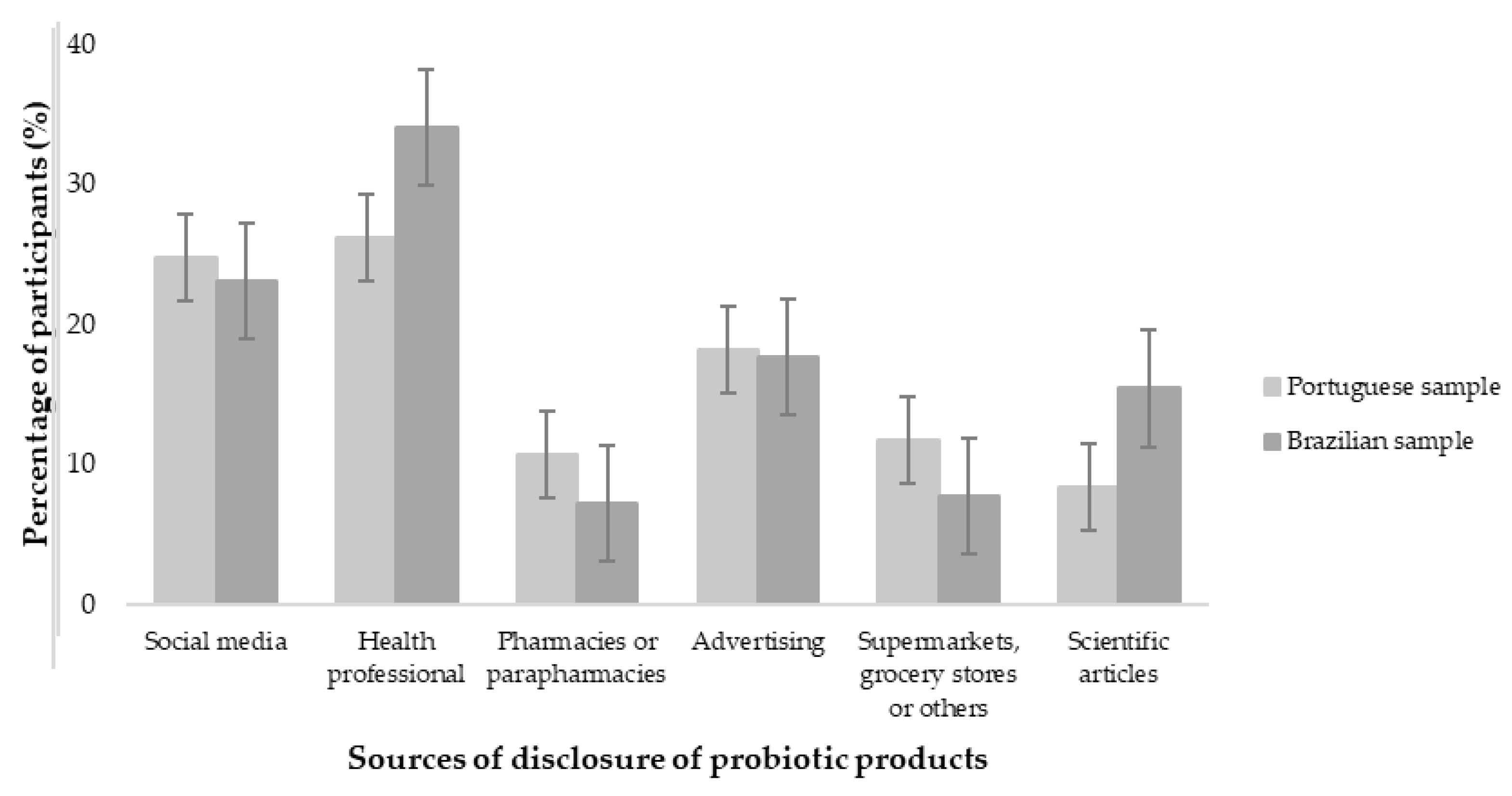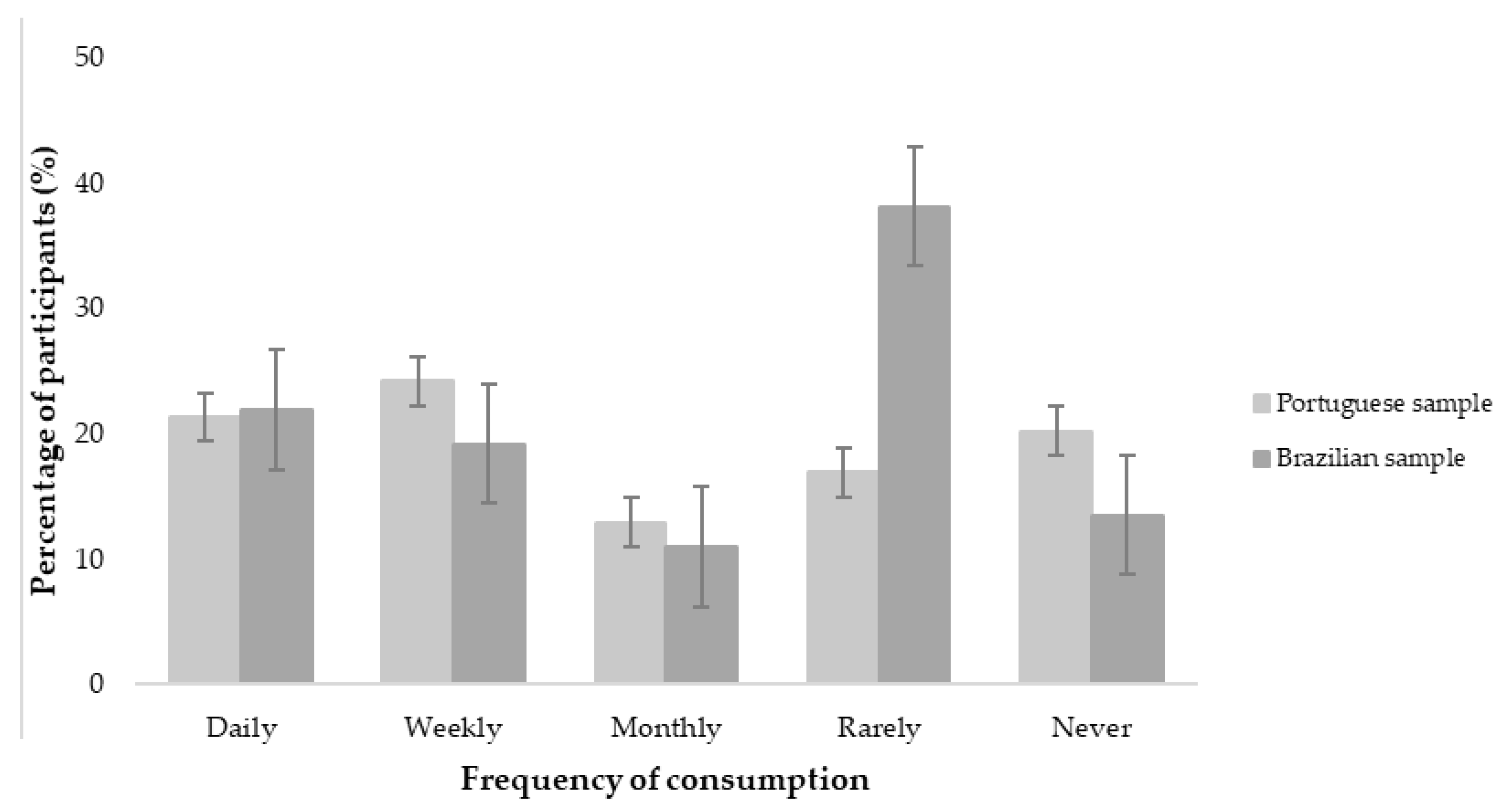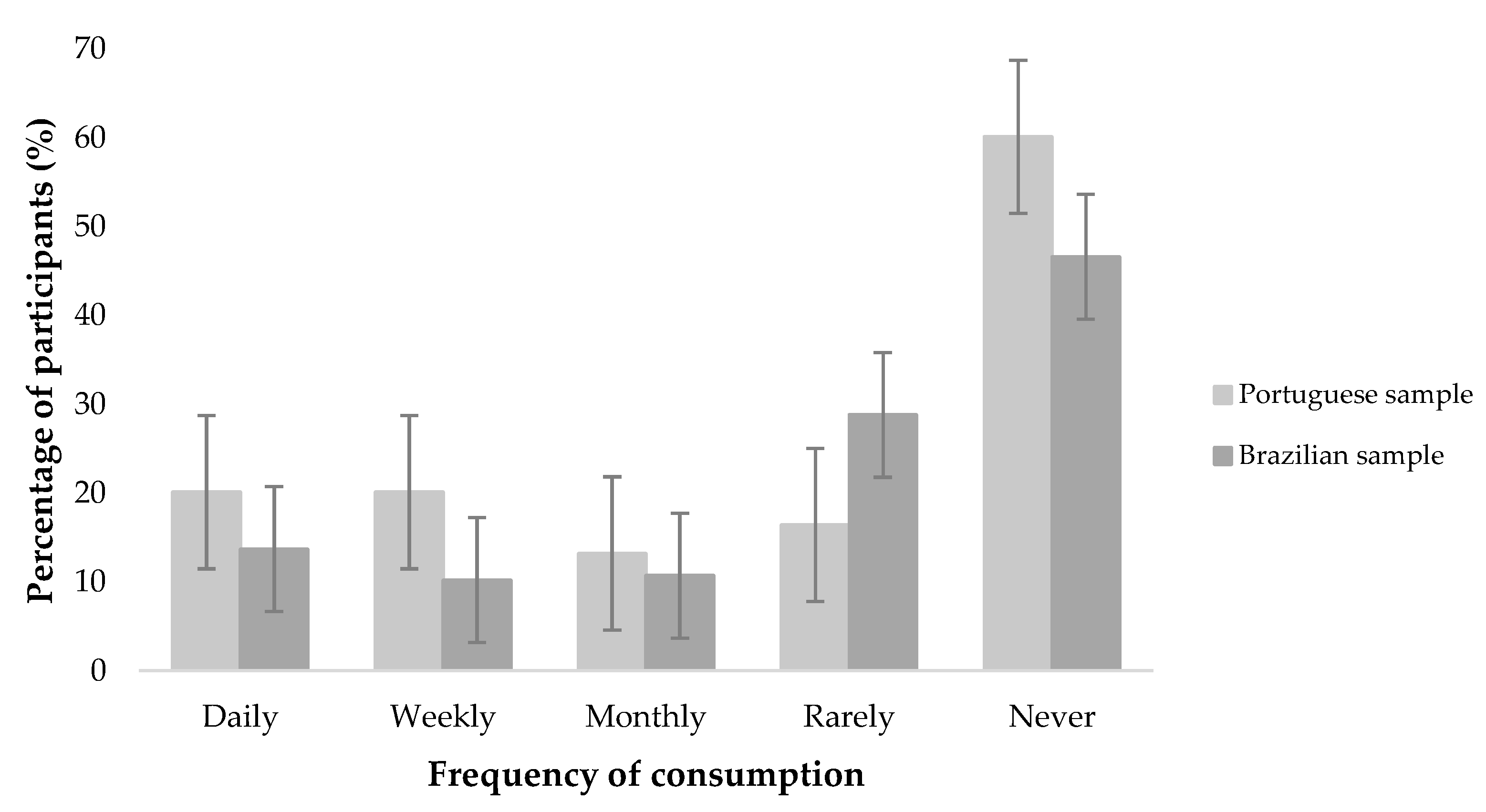Perceptions of Probiotics and Kombucha Consumption in Relation to Emotion Regulation: An Exploratory Study Comparing Portugal and Brazil
Abstract
1. Introduction
2. Materials and Methods
2.1. Participants and Study Design
2.2. Instruments
2.3. Design Procedure
2.4. Statistical Analysis
3. Results
3.1. Characteristics of the Sample
3.2. Consumption of Probiotics and Kombucha in the Portuguese and Brazilian Samples
3.3. Impact of Probiotics and Kombucha Consumption on Emotion Regulation
4. Discussion
5. Limitations and Strengths of the Study
6. Conclusions and Perspectives
Supplementary Materials
Author Contributions
Funding
Institutional Review Board Statement
Data Availability Statement
Conflicts of Interest
References
- Yousefi, B.; Eslami, M.; Ghasemian, A.; Kokhaei, P.; Salek Farrokhi, A.; Darabi, N. Probiotics importance and their immunomodulatory properties. J. Cell. Physiol. 2019, 234, 8008–8018. [Google Scholar] [CrossRef] [PubMed]
- Heinen, E.; Ahnen, R.T.; Slavin, J. Fermented Foods and the Gut Microbiome. Nutr. Today 2020, 55, 163–167. [Google Scholar] [CrossRef]
- Sanders, M.E.; Merenstein, D.; Merrifield, C.A.; Hutkins, R. Probiotics for human use. Nutr. Bull. 2018, 43, 212–225. [Google Scholar] [CrossRef]
- Dahiya, D.; Nigam, P.S. Clinical Potential of Microbial Strains, Used in Fermentation for Probiotic Food, Beverages and in Synbiotic Supplements, as Psychobiotics for Cognitive Treatment through Gut–Brain Signaling. Microorganisms 2022, 10, 1687. [Google Scholar]
- Rea, K.; Dinan, T.G.; Cryan, J.F. Gut Microbiota: A Perspective for Psychiatrists. Neuropsychobiology 2020, 79, 50–62. [Google Scholar] [CrossRef]
- Cheng, W.-Y.; Ho, Y.-S.; Chang, R.C.-C. Linking circadian rhythms to microbiome-gut-brain axis in aging-associated neurodegenerative diseases. Ageing Res. Rev. 2022, 78, 101620. [Google Scholar] [CrossRef]
- Sharma, R.; Gupta, D.; Mehrotra, R.; Mago, P. Psychobiotics: The Next-Generation Probiotics for the Brain. Curr. Microbiol. 2021, 78, 449–463. [Google Scholar] [CrossRef]
- Wang, Y.; Xie, Q.; Zhang, Y.; Ma, W.; Ning, K.; Xiang, J.-Y.; Cui, J.; Xiang, H. Combination of probiotics with different functions alleviate DSS-induced colitis by regulating intestinal microbiota, IL-10, and barrier function. Appl. Microbiol. Biotechnol. 2020, 104, 335–349. [Google Scholar] [CrossRef]
- Kazemi, A.; Noorbala, A.A.; Azam, K.; Eskandari, M.H.; Djafarian, K. Effect of probiotic and prebiotic vs placebo on psychological outcomes in patients with major depressive disorder: A randomized clinical trial. Clin. Nutr. 2019, 38, 522–528. [Google Scholar] [CrossRef]
- Casertano, M.; Fogliano, V.; Ercolini, D. Psychobiotics, gut microbiota and fermented foods can help preserving mental health. Food Res. Int. 2022, 152, 110892. [Google Scholar] [CrossRef]
- Fried, S.; Wemelle, E.; Cani, P.D.; Knauf, C. Interactions between the microbiota and enteric nervous system during gut-brain disorders. Neuropharmacology 2021, 197, 108721. [Google Scholar] [CrossRef] [PubMed]
- Del Toro-Barbosa, M.; Hurtado-Romero, A.; Garcia-Amezquita, L.E.; García-Cayuela, T. Psychobiotics: Mechanisms of Action, Evaluation Methods and Effectiveness in Applications with Food Products. Nutrients 2020, 12, 3896. [Google Scholar] [CrossRef] [PubMed]
- Agirman, G.; Hsiao, E.Y. SnapShot: The microbiota-gut-brain axis. Cell 2021, 184, 2524–2524.e1. [Google Scholar] [CrossRef] [PubMed]
- Niu, M.; Li, Q.; Zhang, J.; Wen, F.; Dang, W.; Duan, G.; Li, H.; Ruan, W.; Yang, P.; Guan, C.; et al. Characterization of Intestinal Microbiota and Probiotics Treatment in Children with Autism Spectrum Disorders in China. Front. Neurol. 2019, 10, 1084. [Google Scholar] [CrossRef] [PubMed]
- Sanctuary, M.R.; Kain, J.N.; Chen, S.Y.; Kalanetra, K.; Lemay, D.G.; Rose, D.R.; Yang, H.T.; Tancredi, D.J.; German, J.B.; Slupsky, C.M.; et al. Pilot study of probiotic/colostrum supplementation on gut function in children with autism and gastrointestinal symptoms. PLoS ONE 2019, 14, e0210064. [Google Scholar] [CrossRef] [PubMed]
- Li, C.; Niu, Z.; Zou, M.; Liu, S.; Wang, M.; Gu, X.; Lu, H.; Tian, H.; Jha, R. Probiotics, prebiotics, and synbiotics regulate the intestinal microbiota differentially and restore the relative abundance of specific gut microorganisms. J. Dairy Sci. 2020, 103, 5816–5829. [Google Scholar] [CrossRef]
- Natale, G.; Ryskalin, L.; Morucci, G.; Lazzeri, G.; Frati, A.; Fornai, F. The Baseline Structure of the Enteric Nervous System and Its Role in Parkinson’s Disease. Life 2021, 11, 732. [Google Scholar] [CrossRef]
- Jayabalan, R.; Malbaša, R.V.; Lončar, E.S.; Vitas, J.S.; Sathishkumar, M. A review on kombucha tea—Microbiology, composition, fermentation, beneficial effects, toxicity, and tea fungus. Compr. Rev. Food Sci. Food Saf. 2014, 13, 538–550. [Google Scholar] [CrossRef]
- Esatbeyoglu, T.; Sarikaya Aydin, S.; Gültekin Subasi, B.; Erskine, E.; Gök, R.; Ibrahim, S.A.; Yilmaz, B.; Özogul, F.; Capanoglu, E. Additional advances related to the health benefits associated with kombucha consumption. Crit. Rev. Food Sci. Nutr. 2023, 1–18. [Google Scholar] [CrossRef]
- Peterson, J.; Garges, S.; Giovanni, M.; McInnes, P.; Wang, L.; Schloss, J.A.; Bonazzi, V.; McEwen, J.E.; Wetterstrand, K.A.; Deal, C.; et al. The NIH Human Microbiome Project. Genome Res. 2009, 19, 2317–2323. [Google Scholar]
- de Campos Costa, M.A.; de Souza Vilela, D.L.; Fraiz, G.M.; Lopes, I.L.; Coelho, A.I.M.; Castro, L.C.V.; Martin, J.G.P. Effect of kombucha intake on the gut microbiota and obesity-related comorbidities: A systematic review. Crit. Rev. Food Sci. Nutr. 2023, 63, 3851–3866. [Google Scholar] [CrossRef]
- Bishop, P.; Pitts, E.R.; Budner, D.; Thompson-Witrick, K.A. Chemical Composition of Kombucha. Beverages 2022, 8, 45. [Google Scholar] [CrossRef]
- Permatasari, H.K.; Nurkolis, F.; Augusta, P.S.; Mayulu, N.; Kuswari, M.; Taslim, N.A.; Wewengkang, D.S.; Batubara, S.C.; Ben Gunawan, W. Kombucha tea from seagrapes (Caulerpa racemosa) potential as a functional anti-ageing food: In vitro and in vivo study. Heliyon 2021, 7, e07944. [Google Scholar] [CrossRef] [PubMed]
- Sinir, G.Ö.; Tamer, C.E.; Suna, S. 10—Kombucha Tea: A Promising Fermented Functional Beverage. In Fermented Beverages; Grumezescu, A.M., Holban, A.M., Eds.; Woodhead Publishing: Delhi, India, 2019; pp. 401–432. [Google Scholar]
- Villarreal-Soto, S.A.; Beaufort, S.; Bouajila, J.; Souchard, J.-P.; Renard, T.; Rollan, S.; Taillandier, P. Impact of fermentation conditions on the production of bioactive compounds with anticancer, anti-inflammatory and antioxidant properties in kombucha tea extracts. Process Biochem. 2019, 83, 44–54. [Google Scholar] [CrossRef]
- Villarreal-Soto, S.A.; Bouajila, J.; Pace, M.; Leech, J.; Cotter, P.D.; Souchard, J.-P.; Taillandier, P.; Beaufort, S. Metabolome-microbiome signatures in the fermented beverage, Kombucha. Int. J. Food Microbiol. 2020, 333, 108778. [Google Scholar] [CrossRef] [PubMed]
- Morales, D. Biological activities of kombucha beverages: The need of clinical evidence. Trends Food Sci. Technol. 2020, 105, 323–333. [Google Scholar] [CrossRef]
- Batista, P.; Penas, M.R.; Pintado, M.; Oliveira-Silva, P. Kombucha: Perceptions and Future Prospects. Foods 2022, 11, 1977. [Google Scholar] [CrossRef]
- Strandwitz, P. Neurotransmitter modulation by the gut microbiota. Brain Res. 2018, 1693, 128–133. [Google Scholar] [CrossRef]
- Hill, C.; Guarner, F.; Reid, G.; Gibson, G.R.; Merenstein, D.J.; Pot, B.; Morelli, L.; Canani, R.B.; Flint, H.J.; Salminen, S. The International Scientific Association for Probiotics and Prebiotics consensus statement on the scope and appropriate use of the term probiotic. Nat. Rev. Gastroenterol. Hepatol. 2014, 11, 506–514. [Google Scholar] [CrossRef]
- Amirani, E.; Milajerdi, A.; Mirzaei, H.; Jamilian, H.; Mansournia, M.A.; Hallajzadeh, J.; Ghaderi, A. The effects of probiotic supplementation on mental health, biomarkers of inflammation and oxidative stress in patients with psychiatric disorders: A systematic review and meta-analysis of randomized controlled trials. Complement. Ther. Med. 2020, 49, 102361. [Google Scholar] [CrossRef]
- Guiné, R.P.; Florença, S.G.; Carpes, S.; Anjos, O. Study of the influence of sociodemographic and lifestyle factors on consumption of dairy products: Preliminary study in Portugal and Brazil. Foods 2020, 9, 1775. [Google Scholar] [CrossRef] [PubMed]
- Fernandes, D.; Peixoto, J.; Oltramari, A.P. A quarta onda da imigração brasileira em Portugal: Uma história breve. Rev. Latinoam. De Población 2021, 15, 34–63. [Google Scholar] [CrossRef]
- Vaz, F.; Martins, C. Diferenciação e regulação emocional na idade adulta: Validação de dois instrumentos de avaliação do reportório e da capacidade de diferenciação e regulação emocional na idade adulta. In Actas da XIII Conferência Internacional Avaliação Psicológica: Formas e Contextos; CD-ROM; Psiquilíbrios: Braga, Portugal, 2008; p. 12. [Google Scholar]
- Barakat, N.; Beaufort, S.; Rizk, Z.; Bouajila, J.; Taillandier, P.; El Rayess, Y. Kombucha analogues around the world: A review. Crit. Rev. Food Sci. Nutr. 2022, 1–25. [Google Scholar] [CrossRef] [PubMed]
- Yilmaz-Ersan, L.; Ozcan, T.; Akpinar-Bayizit, A. Assessment of socio-demographic factors, health status and the knowledge on probiotic dairy products. Food Science and Human Wellness 2020, 9, 272–279. [Google Scholar] [CrossRef]
- Precup, G.; Pocol, C.B.; Teleky, B.-E.; Vodnar, D.C. Awareness, Knowledge, and Interest about Prebiotics—A Study among Romanian Consumers. Int. J. Environ. Res. Public Health 2022, 19, 1208. [Google Scholar] [PubMed]
- Fenster, K.; Freeburg, B.; Hollard, C.; Wong, C.; Rønhave Laursen, R.; Ouwehand, A.C. The Production and Delivery of Probiotics: A Review of a Practical Approach. Microorganisms 2019, 7, 8. [Google Scholar] [CrossRef]
- Patait, M.R.; Saraf, K.V.; Wakchaure, P.M. Assessment of Knowledge and Awareness of Probiotics Among the Dental Post-Graduate Students—A Questionnaire Study. J. Indian Acad. Oral Med. Radiol. 2022, 34, 68–75. [Google Scholar]
- Goubet, K.E.; Chrysikou, E.G. Emotion regulation flexibility: Gender differences in context sensitivity and repertoire. Front. Psychol. 2019, 10, 935. [Google Scholar] [CrossRef]




| Portugal | Brazil | ||||
|---|---|---|---|---|---|
| M | SD | M | SD | ||
| Variable | |||||
| Age | 28.5 | 11.6 | 45.6 | 15 | |
| N | % | N | % | ||
| Gender | Female | 144 | 80.9 | 54 | 74 |
| Male | 34 | 19.1 | 19 | 26 | |
| Marital status | Single | 139 | 78.1 | 32 | 43.8 |
| Cohabitation | 13 | 7.3 | 5 | 6.8 | |
| Married | 24 | 13.5 | 29 | 39.7 | |
| Divorced/separated | 2 | 1.1 | 5 | 6.8 | |
| Widowed | 0 | 0 | 2 | 2.7 | |
| Academic qualifications | Primary/basic education | 1 | 0.6 | 2 | 3 |
| Secondary education | 84 | 48 | 9 | 13.6 | |
| Degree | 48 | 27.4 | 19 | 28.8 | |
| Master’s degree | 39 | 22.3 | 16 | 24.2 | |
| PhD | 3 | 1.7 | 20 | 30.3 | |
| Professional activity | Student | 115 | 64.6 | 18 | 24.7 |
| Other | 63 | 35.4 | 55 | 75.3 | |
| Past psychiatric/psychological follow-up | Yes | 109 | 62.3 | 27 | 37 |
| No | 69 | 37.7 | 46 | 63 | |
| Current psychiatric/psychological follow-up | Yes | 47 | 43.1 | 11 | 37.9 |
| No | 62 | 56.9 | 18 | 62.1 | |
| Portugal | Brazil | |||
|---|---|---|---|---|
| n | % | n | % | |
| Do you know what probiotic products are? | ||||
| Yes | 144 | 81.8 | 70 | 95.9 |
| No | 32 | 18.2 | 3 | 4.1 |
| Do you know about Kombucha? | ||||
| Yes | 116 | 66.3 | 51 | 69.9 |
| No | 59 | 33.7 | 22 | 30.1 |
| Have you consumed Kombucha? | ||||
| Yes | 78 | 44.3 | 43 | 58.9 |
| No | 98 | 55.7 | 30 | 41.1 |
| Portugal | Brazil | |||
|---|---|---|---|---|
| n | % | n | % | |
| Type of probiotic products | ||||
| Yogurts | 102 | 44.2 | 37 | 39.8 |
| Supplements sold in supermarkets | 18 | 7.8 | 11 | 11.8 |
| Supplements sold in pharmacies | 13 | 5.6 | 12 | 12.9 |
| Fermented vegetables | 20 | 8.7 | 10 | 10.8 |
| Medication | 15 | 6.5 | 9 | 9.7 |
| Other products | 63 | 27.3 | 14 | 15.1 |
| Portugal | Brazil | |||
|---|---|---|---|---|
| n | % | n | % | |
| Benefits associated with the consumption of Probiotics | ||||
| Balance of the gastrointestinal tract | 103 | 23.5 | 61 | 28.5 |
| Improvement of the immune system | 101 | 23.1 | 50 | 23.4 |
| Stimulation of bacterial growth in the intestine | 59 | 13.5 | 34 | 15.9 |
| Improvement of mental health | 54 | 12.3 | 17 | 7.9 |
| Emotion regulation | 51 | 11.6 | 13 | 6.1 |
| Improvement of cognitive functions | 28 | 6.4 | 11 | 5.1 |
| Prevention of cardiovascular diseases and cancer | 24 | 5.5 | 10 | 4.7 |
| Stronger bone structure | 15 | 3.4 | 9 | 4.2 |
| Antidiabetic effect | 3 | 0.7 | 9 | 4.2 |
| Portugal | Brazil | |||
|---|---|---|---|---|
| n | % | n | % | |
| Benefits associated with the consumption of Kombucha | ||||
| Improvement of gastrointestinal activity | 80 | 30.4 | 44 | 37 |
| Anti-inflammatory effect | 57 | 21.7 | 27 | 22.7 |
| Emotion regulation | 45 | 17.1 | 8 | 6.7 |
| Antibacterial effect | 36 | 13.7 | 17 | 14.3 |
| Improvement of cognitive functions | 28 | 10.6 | 9 | 7.6 |
| Antidiabetic effect | 12 | 4.6 | 10 | 8.4 |
| Anti-proliferative effect | 5 | 1.9 | 4 | 3.4 |
| Frequency of Consumption of Probiotics and Kombucha | |||||||||||
|---|---|---|---|---|---|---|---|---|---|---|---|
| Daily | Weekly | Monthly | Rarely | Never | |||||||
| n | % | n | % | n | % | n | % | n | % | ||
| Age class | |||||||||||
| 18–35 | P | 34 | 13.8 | 40 | 16.2 | 21 | 8.5 | 32 | 13 | 34 | 13.8 |
| K | 13 | 5.1 | 13 | 5.1 | 8 | 3.1 | 25 | 9.8 | 109 | 42.9 | |
| 36–53 | P | 13 | 5.3 | 12 | 4.9 | 7 | 2.8 | 10 | 4 | 2 | 0.8 |
| K | 12 | 4.7 | 7 | 2.8 | 4 | 1.6 | 10 | 3.9 | 11 | 4.3 | |
| 54–76 | P | 8 | 3.2 | 7 | 2.8 | 3 | 1.2 | 20 | 8.1 | 4 | 1.6 |
| K | 3 | 1.2 | 4 | 1.6 | 1 | 0.4 | 10 | 3.9 | 24 | 9.4 | |
| Probiotics | Kombucha | |||||
|---|---|---|---|---|---|---|
| n | M (ERQ) | SD (ERQ) | n | M (ERQ) | SD (ERQ) | |
| Frequency of consumption | ||||||
| Daily | 55 | 39.91 | 7.52 | 28 | 39.07 | 7.2 |
| Weekly | 59 | 39.83 | 10.42 | 24 | 37.38 | 7.24 |
| Monthly | 31 | 38.39 | 10.19 | 13 | 42.39 | 6.56 |
| Rarely | 62 | 39.39 | 13.27 | 45 | 41.8 | 11.76 |
| Never | 40 | 38.35 | 14.53 | 144 | 38.9 | 12.48 |
Disclaimer/Publisher’s Note: The statements, opinions and data contained in all publications are solely those of the individual author(s) and contributor(s) and not of MDPI and/or the editor(s). MDPI and/or the editor(s) disclaim responsibility for any injury to people or property resulting from any ideas, methods, instructions or products referred to in the content. |
© 2023 by the authors. Licensee MDPI, Basel, Switzerland. This article is an open access article distributed under the terms and conditions of the Creative Commons Attribution (CC BY) license (https://creativecommons.org/licenses/by/4.0/).
Share and Cite
Góis, M.; Batista, P.; Araújo, M.; Oliveira-Silva, P. Perceptions of Probiotics and Kombucha Consumption in Relation to Emotion Regulation: An Exploratory Study Comparing Portugal and Brazil. Beverages 2023, 9, 61. https://doi.org/10.3390/beverages9030061
Góis M, Batista P, Araújo M, Oliveira-Silva P. Perceptions of Probiotics and Kombucha Consumption in Relation to Emotion Regulation: An Exploratory Study Comparing Portugal and Brazil. Beverages. 2023; 9(3):61. https://doi.org/10.3390/beverages9030061
Chicago/Turabian StyleGóis, Maria, Patrícia Batista, Magnólia Araújo, and Patrícia Oliveira-Silva. 2023. "Perceptions of Probiotics and Kombucha Consumption in Relation to Emotion Regulation: An Exploratory Study Comparing Portugal and Brazil" Beverages 9, no. 3: 61. https://doi.org/10.3390/beverages9030061
APA StyleGóis, M., Batista, P., Araújo, M., & Oliveira-Silva, P. (2023). Perceptions of Probiotics and Kombucha Consumption in Relation to Emotion Regulation: An Exploratory Study Comparing Portugal and Brazil. Beverages, 9(3), 61. https://doi.org/10.3390/beverages9030061









